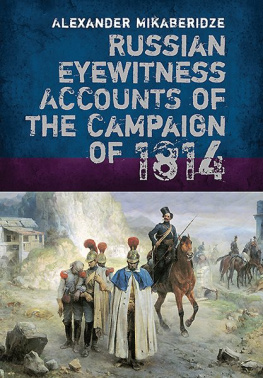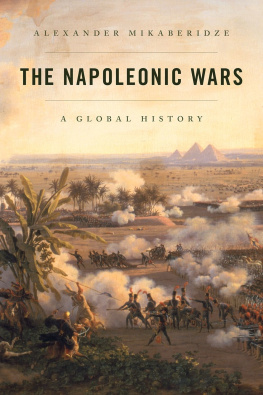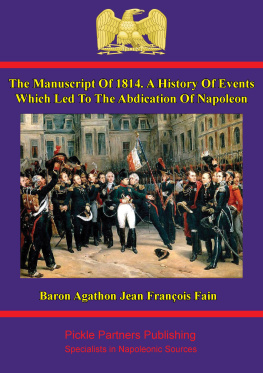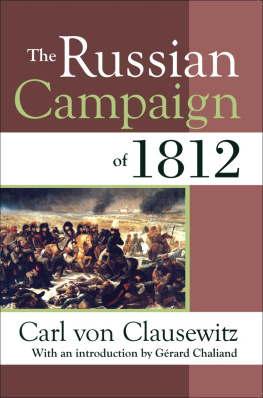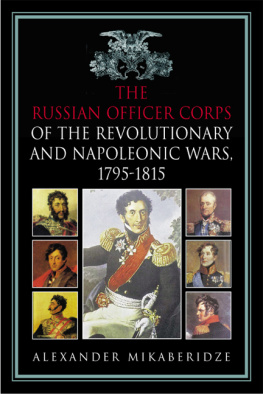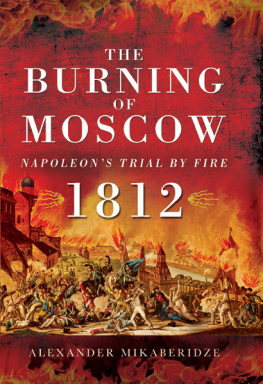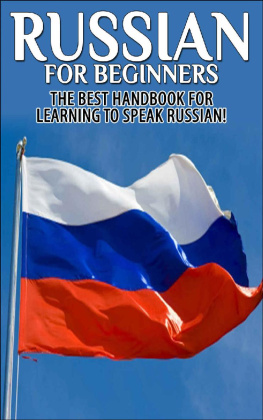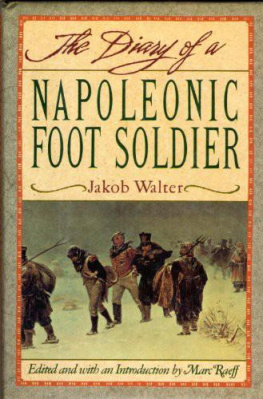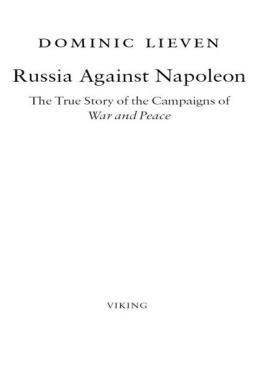
Russian Eyewitness Accounts of the Campaign of 1814
This edition published in 2013 by Frontline Books,
an imprint of Pen & Sword Books Ltd,
47 Church Street, Barnsley, S. Yorkshire, S70 2AS
www.frontline-books.com
Copyright Alexander Mikaberidze 2013
The right of Alexander Mikaberidze to be identified as the author of this
work has been asserted by him in accordance with the Copyright, Designs
and Patents Act 1988.
ISBN: 978-1-84832-707-8
PDF ISBN: 978-1-47382-948-0
EPUB ISBN: 978-1-47382-862-9
PRC ISBN: 978-1-47382-905-3
All rights reserved. No part of this publication may be reproduced, stored
in or introduced into a retrieval system, or transmitted, in any form, or by
any means (electronic, mechanical, photocopying, recording or otherwise)
without the prior written permission of the publisher. Any person who does
any unauthorized act in relation to this publication may be liable to criminal
prosecution and civil claims for damages.
CIP data records for this title are available from the British Library
For more information on our books, please visit
or write to us at the above address.
Printed and bound by CPI Group (UK) Ltd, Croydon, CR0 4YY
Typeset in 10/12.25 point Plantin MT by JCS Publishing Services Ltd,
www.jcs-publishing.co.uk
Contents
Illustrations
Maps
Plates
Preface
In the spring of 1814, after twenty-two years, France was once again invaded by enemy forces. Following Emperor Napoleons defeats in Russia and Germany, the victorious Allies (Russia, Austria, Prussia and their German allies) had crossed the Rhine with an intention to put an end to a long-standing conflict with the Napoleonic regime. For the first time in a quarter of a century France had the first real taste of an experience she had so often previously meted out to her neighbours. Outnumbered on all fronts, Napoleon fought a brilliant campaign in February but none of his successes could turn the tide of war. The Allies persevered in their goal of seeing the French Empire overthrown and marched directly on to Paris.
In the afternoon of 30 March 1814, Emperor Alexander of Russia arrived on the Buttes-Chaumont and, ascending a nearby hill, surveyed the city rising in front of him in the distance. It was Paris, the city Alexander had longed to see for many years and now only hours separated him from a triumphant entry into the capital of his greatest enemy. On horseback since dawn, Alexander supervised unit movements and marked out his officers for promotions and rewards. By afternoon, the Allies had established large batteries and first few shots were fired into Paris. and, since the officer was not empowered to accept such terms, the Russian sovereign sent his aide-de-camp Colonel Orlov to Marshal Auguste Marmont who was directing the French defences and by dawn on 31 March, the act of surrender of the French capital was signed
Early that morning, Emperor Alexander mounted Eclipse, a horse presented to him by the French ambassador six years before, and prepared for the moment of his life. He rode with his staff to King Frederick Williams headquarters at Pantin and the two sovereigns then led the Allied troops into Paris. Nesselrode was struck by a well-dressed crowd covering boulevards. It seemed as if people gathered for a festivity, rather than to witness the entry of enemy troops. Alphonse de Lamartine described streets swarming with the populace, some hoping for a riot:
[Upon the appearance of the Russian officers,] the people of the quarter of the Bastille arose in a tumult, and uttered, in sign of defiance, shouts of Vive Bonaparte! Some armed men rushed out of the crowd towards an aide-de-camp of the Emperor Alexander, who was going to prepare his quarters. Come on. Frenchmen! cried these desperate fellows. The Emperor Napoleon is coming! Let us destroy the enemy! The people, however, were deaf to the cry. The National Guard interposed, protected the detachment, and picked up a few wounded officers. The heads of the foreign columns soon after appeared on the Boulevards.
Starting around 9 a.m., the Allied columns, with colours unfurled, drums beating and music playing, began a triumphant entry into Paris. The Russian cavalry, with the Life Guard Cossack Regiment and Grand Duke Constantine at its head, led the way and Lamartine thought they represented barbarous war evoked from the deserts of the north to spread over the south. Another spectator observed that the physiognomy of the Russian troops indicated strongly the different nations to which they belonged. Indeed, Thomas Richard Underwood, an Englishman visiting the French capital, saw the streets thronged with
People of every description inhabitants of all the north of Europe, and the Asiatic subjects of the Russian empire, from the Caspian Sea to the Wall of China, were riding about; Cossacks, with their sheep-skin jackets, sandy-coloured, shaggy beards, long lances Calmucks, and different Tartar tribes, with their flat noses, little eyes, and dark reddish-brown skins; Baschkins and Tungusians of Siberia, armed with bows and arrows; Tscherkess or Circassian noblemen from the foot of Mount Caucasus, clad in complete hauberks of steel mail, perfectly bright, and conical helmets, similar in form to those worn in England in the twelfth and thirteenth centuries.
Behind the Russian cavalry came Alexander, Frederick William and Schwarzenberg, accompanied by their generals and an enormous suite, and followed by tens of thousands of Allied soldiers.
Count Louis-Victor-Lon de Rochechouart, a French migr who served in the Russian army, noted that Napoleons latest reports had represented [the Allied] army as exhausted, disorganised and reduced to inefficiency [Now] this display of overwhelming force seemed to make a great impression on the Parisians. The most numerous and brilliant staff ever assembled completed the picture. Add to this, an electrified crowd, shouts from more than a hundred thousand voices, Long live the Emperor Alexander! Long live the King of Prussia! Long live the King! Long live the Allies! Long live our Deliverers, mingled with words of command in Russian and German, the sound of carriages and horses, the tramp of infantry; the scene is indescribable.
According to the Journal des Dbats, the Allied entry was accompanied everywhere by the signs of unambiguous sentiments of the inhabitants of the capital. Everywhere they spoke to the troops, they got along and have but one sentiment: hatred for their oppressors and the desire to return the legitimate authority that had been tested by the centuries and was the only worthy one of France and Europe that of the princes of the house of Bourbon, this majestic august house which had brought happiness and true glory to France for centuries.
The parade review ended about five oclock in the afternoon, when Alexander retired to the house of Charles Maurice Prigord de Talleyrand, where he resided during the early period of his stay in Paris. Some of the Russian troops mounted guard, and the rest took up the quarters assigned them in the city. These were the best days for the Russian sovereign and his presence elevated European esteem of Russia to hitherto unprecedented heights. The behaviour of the Russian troops was meticulously regulated by Alexander himself, who intended to ensure and maintain Russian prestige. According to Jacob Otroshenko from the 14th Jagers, many Frenchmen asked us what we are going to with Paris, are we going to burn it like the French did with Moscow?
Among the officers who could not sleep that night was Mikhailovskii-Danilevskii, who, around midnight, decided to walk in the streets and was pleased to see Parisians of all walks of life respecting a Russian uniform: I walked throughout Palais-Royal, stopped by the crowds of Parisians and was everywhere met with great courtesy. As he returned home walking along deserted streets, Mikhailovskii-Danilevskii was happy to note that not a sound was heard in the streets of Paris, save for the call of the Russian sentries.
Next page
